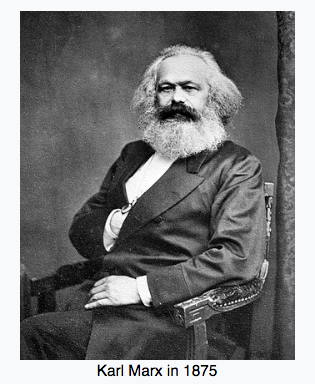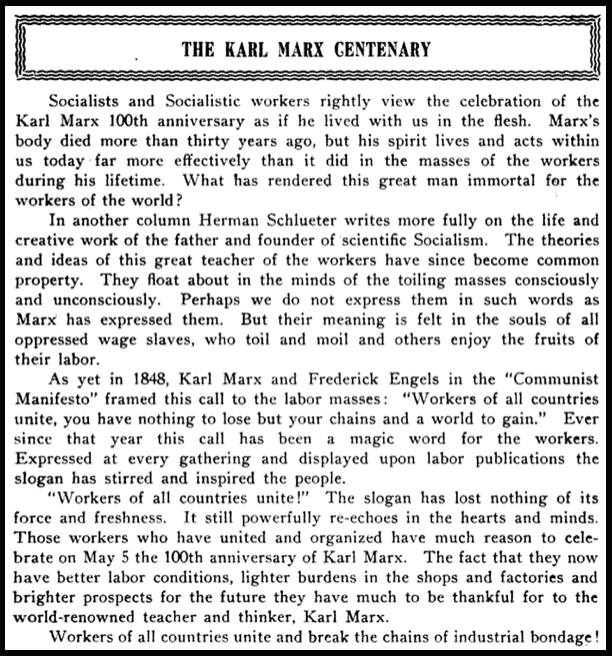Proletarier aller Länder, vereinigt euch!
-Karl Marx, 1848
Hellraisers Journal, Sunday May 5, 1918
Workers of the World Celebrate Karl Marx Centenary
From The Young Socialists’ Magazine of May 1918:
Marx and the Young People.
by Eugene V. Debs
The day and the year that Karl Marx was born—May 5th, 1818—appear in red letters in the calendar of the social revolution. For on that day the eyes of the revolution’s prophet and pioneer opened upon the world. In fancy we can see the baby Marx engaged in his first struggle, doing his best and worst in baby fashion to give evidence that he was alive and to have his arrival duly noted. We can next see a little toddler nosing about for a suitable opening for his prying activities, little dreaming of the prodigious task awaiting him on the stage of life.
And now appears the boy, the youth upon the scene, and sober facts begin to jostle rosy dreams in his dawning mentality and imagination.
Marx, the boy, was healthy, handsome, and natural, full of the sap and song and sweetness of life. Like all normal boys he loved play and pranks, and for the same reason he was also serious and studious, and quite early he began to realize that life meant struggle and service and that he must in grave earnest prepare himself to act nobly his part in the great drama that spread out before his awakening vision.
The boy, Marx, in the light of his subsequent phenomenal career, and of the social revolution now thundering at the doors of the capitalist world, presents a vivid theme and a fascinating study for the young people of today who are reaping in knowledge and strength, in inspiration and high resolve, where he sowed in poverty and pain, in suffering and exile, to the very end of his days.
* * * * *
It is peculiarly appropriate that the centenary of the birth of Karl Marx should be celebrated by the Young People’s Socialist League. The program of appreciation would be sadly incomplete without the participation of the young people who have been quickened into new life and have had their eyes opened upon a new world by the magic of his awakening philosophy, and directed toward the shining goal of international freedom and fellowship under his masterly and inspiring leadership.
The heart of every young socialist throbs faster and keener with the zest of life as he contemplates the lofty figure of Karl Marx in perspective and what his coming has meant to the cause of oppressed humanity, especially the enslaved and exploited workers of the world.
Karl Marx, the founder of modern socialism and of the international socialist movement, was indeed an intellectual titan, but he was more than that, he was in the supremest sense a Man! He had the exalted moral character to match his commanding genius. He was firm as an oak, yet tender as a babe. He was absolutely honest. He could not dissimulate. He knew not how to be hypocritical. He was a stranger to the ways of darkness.
What he saw with his keen eye and thought with his clear brain and felt with his warm heart, he also had the courage to utter with his honest tongue and to stand or fall by without equivocation or compromise.
The crowned despots of Europe who hounded Marx and his loved ones into poverty and exile would have vied with each other in opening wide their palace doors to him and showering him with wealth and honors had he but known how to trim and compromise for the sake of harmony and peace.
But Marx did not know how to make traffic of his talents or how to barter away his principles; he scorned to deny the truths he had launched that make thrones tremble, or to betray the trust of the downtrodden who looked to him for counsel and leadership, and this at once sealed his doom and gave his name to glory.
In the harrowing exile and pitiful poverty that followed, the moral heroism of Marx was monumental, and it was during these tragic days and years that his adored wife, the beautiful and charming Jenny of Westphalen, rose to the supreme height of her noble womanhood and sustained the cause for which they were banished with a courage and fortitude that defy fitting characterization.
Jenny Marx, his beloved wife, shared equally with Karl Marx the bitterest poverty and the most relentless persecution for the sake of the cause we love today, and on this centenary anniversary we hail them both with pride and joy as the inspired prophets of internationalism and the thrice-honored leaders of the social revolution.
[Emblem of Young Peoples’ Socialist League added.]
From St. Louis Labor of May 4, 1918:
Karl Marx the Man: An Appreciation
by Eugene V. Debs
In his biographical memoirs of Marx the elder Liebknecht says:
Marx, the man of science, the editor of the Rheinische Zeitung, one of the founders of the Deutsch-Franzoesicher Jarbuecher, one of the authors of the Communist Manifesto, the creator of Capital—this Marx belongs to publicity, he stands before the whole world, the target of criticism, challenging critique, not hiding the smallest wrinkle to a searching eye—were I to attempt writing about this Marx, then I should be guilty of a reckless imprudence indeed, for that is not feasible in the short minutes I can filch and wrest from the unavoidable work of the day and hour.
Just so I feel when called upon in the press of these feverish and fitful days to write something befitting so majestic a theme as Marx the Man, in commemoration of the day, 100 years ago, that gave this titan to the world.
It seems prophetic of the birth of Karl Marx, on May 5, that the centenary of that portentous event should be celebrated by 100 million of his devotees in the midst of the crash and collapse of capitalism, and in the throes of a worldwide war that threatens the ruling powers with worldwide revolution.
The spirit, the genius, the very soul of Marx are all aflame and incarnate in this greatest upheaval in ancient or modern times.
But it is not of Marx the revolutionary inspirer and leader that I am to write, but of Marx the Man, and in the presence of such a task I may well falter, for what pen or tongue among us could do it justice?
Marx the Man is too great a theme.
As some tall cliff, that lifts its awful form,
Swells from the vale, and midway leads the storm.
Though round its breast the rolling clouds are spread,
Eternal sunshine settles on its head.Marx is almost too big to write about, and this is said with the homage commanded by the majesty of the man, but not with the blind adulation with which unthinking idolators regard the so-called great men of history.
Karl Marx as a scientific and scholarly investigator, writer and author in the field of economic, political, and social research, stands preeminent before the world. As the triumphant awakener of the long asleep and the revolutionary leader of the long-enslaved masses of mankind he towers above us a titan and without a peer in history. But it is in his character as a man that he stands supreme and challenges the respect and love, the admiration and emulation of the modern world.
Had Marx the Man been weak, Marx the scientist and scholar never [would have] aroused, inspired, and set into motion the masses by his masterly genius and filled the world with the fame of his immortal achievement.
Marx the Man towered even above Marx the intellectual titan of his day.
Stern, inflexible, self-forgetting, and rigidly scrupulous and honest, he presents to us today the inspiring figure of a man.
Victor Hugo began his oration on Voltaire’s centenary celebration with the simple yet sublime sentence: “One hundred years ago a man was born.” And so we say of our beloved Marx today: “One hundred years ago a MAN was born.”
In the world of men there is nothing so rare as a man.
Karl Marx had every ingredient essential to that incomparable thing we know as character; he bore upon his lofty brow the invisible crown of manhood.
There was not a soft spot in his armor and yet his was the tenderest of hearts and he overflowed with tears when he looked upon his own poverty-stricken, agonizing wife and starving babes and contemplated the misery of the numberless victims of the barbarous system his genius had stripped to the skeleton and was sworn to banish from the earth.
What Marx might not have commanded had the moral power of the man not supplemented the intellectual power of the genius?
Had he but consented to negotiate, to bargain, to compromise with the ruling powers he and his loved ones would never have been driven into the desert and compelled to eat in cold and hunger and tears the bitter bread of poverty and exile. But Karl Marx was immeasurably above and beyond temptation; his loft character disdained all dickering and temporizing, he stood at all times and in all situations inflexible as granite in his moral rectitude, and though he and his dear ones might be thrown into the street and perish of cold and starvation, he would not, could not pervert or prostitute his ideas and ideals, the children of his brain and soul.
Just as the unquenchable passion of Marx the revolutionist flamed out under persecution and exile, so the inherent nobility of his character as a man shown forth in the darkest hour of poverty that enshrouded his humble home and threatened his beloved wife and darling brood with gaunt starvation.
Oh, the awful price that Marx the man paid to give Marx the genius to the world and consecrate Marx the revolutionist to the emancipation of the race.
He loved, aye, adored his beautiful and brilliant wife, the incomparable Jenny of Westphalen, and their brood of little ones, but more precious even than these and dearer far than his own life was the great cause, and for this the immortal Marx, the intellectual pathfinder, the moral leader and proletarian liberator, suffered crucifixion on a thousand crosses, sustained by the inexorable faith within him that the hated ideas and ideals he so devoutly cherished would one day flood the earth with light and rule the race throughout the world.
The moral grandeur and impregnability of the man shine forth in all their matchless luster today and in its splendor we behold not only Marx the Man, but Jenny Marx the Woman, who from first to last was his inspiration, his ministering angel, and his unfailing refuge and support. Her courage and fortitude never wavered; her loyalty to the cause was supreme; her devotion to her husband sublime.
Karl Marx and Jenny Marx, the adored wife, stand before us today, and with infinite pride and joy we hail them across the first century as the immortal leaders of the social revolution now shaking the earth and destined to destroy despotism in all its forms, and emancipate the race from the slavery of the ages
From The Ladies’ Garment Worker of May 1918:
———-
The 100th Anniversary of the
Birth of Karl MarxBy HERMAN SCHLUETER
A hundred years ago, on the fifth of May, 1918, at Trier, in the Rhineland, Karl Marx was born, a man to whom the working class of the world owes more than to any other human being. Despite the raging war and despite the thunder of battle, he will, therefore be remembered during these days in all countries and in all tongues, on this and on yonder side as a man who has devoted all his rich knowledge, all his great abilities towards the one aim: THE EMANCIPATION OF THE WORKING CLASS!
His rich knowledge! As Darwin has discovered the law of evolution of organic nature, so has Karl Marx discovered the law of evolution of human history. It was Marx who established the simple historical fact that all the various forms of human society depend upon how people eat, drink, live and clothe themselves and how they obtain the means of subsistence. Each step of economic evolution of a people or of a period, therefore, forms the basis “from which the political structure of the State, the conception of law, art and even the religious idea of the people in question have developed and out of which they must also be explained—not, as has heretofore been the case, but the contrary.”—Engels.
Besides this great scientific discovery, by which human history was put upon its real basis and by which particularly the class-character of all previous society was put into the proper light, Marx has established the special law of evolution of the present capitalistic production and the bourgeois society created by it He discovered that all social wealth is accumulated surplus value; surplus value, which the worker has created above his pay; value, which the capitalist pockets without giving the worker any compensation for it; value, accumulated for that purpose to exploit the worker with it and by it still more.
The materialistic conception of history and the theory of surplus value—these are the two most important scientific discoveries of Karl Marx. Both of them still form the basis of the entire Socialistic theory of today and without it the labor movement of the world would not even now, have an insight into their real task and no perception of their actual aim.
And therein Karl Marx saw his life’s task: he wanted to enlighten the workers about their historical mission; wanted to show them the road to their final emancipation! He pursued his scientific researches not for the sake of science—and there he differed from the ordinary representative of science—but he wanted to put his knowledge at the service of the working class. “Science was for Marx a motive, a revolutionary force” and to have placed this revolutionary force at the disposal of the labor movement of the world—that is the great merit of this great thinker and fighter.
And from his early youth the great knowledge of this extraordinary man has been at the service of the labor movement of the world.
There hardly existed outside of England—a movement of the working class, when the eagle eye of Marx already perceived its historic importance. At that time already he gave to the workers the famous motto: “Proletarians of all Nations, unite!” which has since become the battle cry of the workers of the entire world. At that time he already began to devote his entire knowledge and his whole power to the realization of this sentence and to prepare the working masses for this revolutionary task. “Because Marx was above all a revolutionist. To co-operate, in this or any other manner, in the overthrow of capitalistic society and the political institutions created by it, to aid in the emancipation of the modern proletariat, to which he had first given the consciousness of its own condition and necessities, consciousness of the conditions for its emancipation—that was his true life vocation.”—Engels.
And this vocation he followed when he created the International Workingmen’s Association and gave it aim and substance. And he has filled this vocation with his numerous writings, with his work, with all his actions to the end of his life. And, therefore, today, on his hundredth anniversary, he will be remembered in every hut, factory and workshop, from the icy fields of Siberia to the sunny coast of the Pacific.
And, therefore, today all clear sighted workers of all countries reach hands across the battle fields and gain consolation and hope for the future from the great words of Marx, which will become reality for all that and all that:
“WORKERS OF THE WORLD, UNITE!”
SOURCES
Debs Intern Archive-1918
https://www.marxists.org/archive/debs/#1917
The Young Socialists’ Magazine
(Chicago, Illinois”
-May 1918, page 2
“Marx and the Young People” by Eugene V. Debs
Note: Marx and Young People shown without quotes is mislabeled and is actually
-Message to Cleveland Comrades from Stark County Work House
by Ruthenberg, Wagenknecht, and Baker
https://www.marxists.org/history/usa/parties/spusa/1918/0500-debs-marxandyoung.pdf
St. Louis Labor
(St Louis, Missouri)
-May 4, 1918, page 1
https://www.marxists.org/history/usa/parties/spusa/1918/0504-debs-marxtheman.pdf
The Ladies’ Garment Worker, Volume 9
International Ladies ̓Garment Workers ̓Union, 1918
https://books.google.com/books?id=GccUAAAAYAAJ
Cover & Contents for May 1918
https://play.google.com/books/reader?id=GccUAAAAYAAJ&printsec=frontcover&pg=GBS.RA1-PA35
“Karl Marx Centenary”
https://play.google.com/books/reader?id=GccUAAAAYAAJ&printsec=frontcover&pg=GBS.RA2-PA5
“The 100th Anniversary of the Birth of Karl Marx” by Herman Schlueter
https://play.google.com/books/reader?id=GccUAAAAYAAJ&printsec=frontcover&pg=GBS.RA2-PA6
IMAGES
SPA, Young Peoples Socialist League Emblem
http://www.marxisthistory.org/subject/usa/eam/ypsl.html
Karl Marx, 1818-1883, wiki
https://en.wikipedia.org/wiki/Karl_Marx
Jenny von Westphalen, 1814-1881, wiki
https://en.wikipedia.org/wiki/Jenny_von_Westphalen
See also:
Young People’s Socialist League
https://www.marxists.org/history/usa/eam/other/ypsl/ypsl.html
The Young Socialists Magazine
Note: samples can be found here
-sadly, not for year 1918
https://www.yumpu.com/en/document/view/46626600/young-socialists-magazine-1915-jan-junepdf
Karl Marx
http://spartacus-educational.com/TUmarx.htm
Marx Engels Archive
https://www.marxists.org/archive/marx/
The Communist Manifesto
https://en.wikipedia.org/wiki/The_Communist_Manifesto
Manifesto of the Communist Party
https://www.marxists.org/archive/marx/works/1848/communist-manifesto/index.htm
Manifesto of the Communist Party
-by Karl Marx, Friedrich Engels
C.H. Kerr, 1906
https://books.google.com/books?id=s2iEeCJAlusC
Re first edition of 1848:
https://play.google.com/books/reader?id=s2iEeCJAlusC&printsec=frontcover&output=reader&hl=en&pg=GBS.PA3
“Working men of all countries unite!”
https://play.google.com/books/reader?id=s2iEeCJAlusC&printsec=frontcover&output=reader&hl=en&pg=GBS.PA64
The International Workingmen’s Association
https://www.marxists.org/archive/marx/works/1864/iwma/index.htm
Karl Marx and the Civil War
-by Herman Schleuter [also: Hermann Schlüter]
Girard, Kan., Appeal to Reason, ab/ 1921
https://catalog.hathitrust.org/Record/004976666
“Hermann Schlüter” by Algernon Lee
New York Call of Jan 29, 1919
http://www.marxisthistory.org/history/usa/parties/lfed/german/1919/0129-lee-hermanschleuter.pdf
~~~~~~~~~~~~~~~~~~~~~~~~~~~~~~~~~~~~~~~~~~~~
The Preacher and the Slave – Utah Phillips
Lyrics by Joe Hill
http://joehill2015.org/joe-hill/joe-hill-songs/the-preacher-and-the-slave/
Workingmen of all countries unite
Side by side we for freedom will fight
When the world and its wealth we have gained
To the grafters we’ll sing this refrain
You will eat, bye and bye
When you’ve learned how to cook and to fry
Chop some wood, twill do you good
And you’ll eat in the sweet bye and bye (that’s no lie)!




